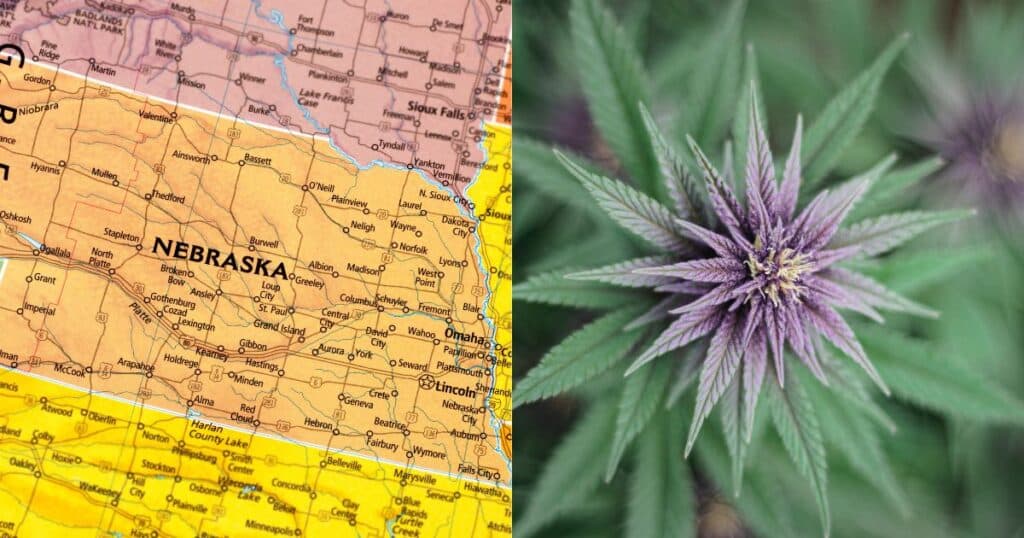The fight for medical marijuana legalization in Nebraska is reaching a boiling point. In a surprising twist, John Kuehn, a former state senator and long-time opponent of cannabis legalization, has filed a lawsuit seeking to invalidate the state’s medical cannabis petitions. This legal challenge aims to remove the two certified marijuana measures, ‘The Patient Protection Act’ and ‘Medical Cannabis Regulation Act’, from the November ballot or block the counting of their results.
Nebraska Medical Marijuana Initiatives
On September 13, Secretary of State Bob Evnen certified both medical marijuana petitions for the November general election ballot. These initiatives, known as ‘The Patient Protection Act’ and ‘Medical Cannabis Regulation Act,’ spearheaded by Nebraskans For Medical Marijuana, propose significant changes to the current legal landscape surrounding medical cannabis in Nebraska.
The Patient Protection Act: This measure would enact a statute that eliminates penalties under state and local law for individuals who use, possess, or acquire up to five ounces of cannabis for medical purposes. This applies to patients who have received a written recommendation from a healthcare practitioner. Additionally, caregivers could assist qualified patients in these activities without facing legal consequences.
The Medical Cannabis Regulation Act: This initiative would lead to establishing a statute that removes penalties under state law for the possession, manufacture, distribution, delivery, and dispensing of cannabis for medical purposes by registered private entities. It also aims to create the Nebraska Medical Cannabis Commission, which will be responsible for overseeing and regulating these activities.
Legal Challenge of Medical Marijuana Initiatives
John Kuehn’s lawsuit, filed just one day before the Nebraska Secretary of State needed to finalize the November ballot, aims to invalidate the state’s medical cannabis petitions. Kuehn alleges several violations, including invalid signatures and improper notarizations. He specifically claims that thousands of signatures, including those from non-registered voters and those missing required information, should not count.
The lawsuit’s stakes are significant. If successful, it could potentially remove the medical cannabis measures from the ballot. Kuehn’s legal strategy focuses on questioning the petition process’s legitimacy by alleging that the campaign failed to adhere strictly to state laws and constitutional requirements.
According to the Nebraska Examiner, Kuehn’s filing states that officials confirmed nearly 90,000 signatures on the legalization petition, but he alleges that at least some signatures were counted illegally:
- 13,243 signatures where the petition circulators did not disclose whether they were paid or unpaid.
- 2,433 signatures from signers who are not registered voters.
- 568 signatures where the notarizations are legally invalid because the circulator was not in the presence of a notary when the petition was filed.
- 411 signatures from voters where the date of birth on the petition doesn’t match the purported signer’s voter registration file.
- 134 signatures from signers who didn’t provide any address.
- 67 signatures from signers who signed the petition more than once and that Evnen failed to strike from the signature count.
- 60 signatures that pre-date the signature gathering window (in summer 2023).
- 48 signatures where the voter who was not a registered voter until after the petition was submitted for validation.
- 21 signatures that post-date the petition’s submission for validation, and 15 signatures where the notarization post-dates that submission (July 3, 2024).
Key Arguments and Allegations
One of Kuehn’s primary allegations is that counting thousands of signatures on the legalization petition was improper. He highlights specific issues, such as circulators failing to disclose whether they were paid or unpaid, non-registered voters signing, and invalid notarizations. These alleged discrepancies form the crux of his argument that the petitions are legally insufficient.
Kuehn’s original lawsuit included charges that Nebraska couldn’t legalize marijuana in any form because the federal government still classifies it as a Schedule I drug. Although the court later dropped this charge, it highlights the ongoing tension between state and federal laws regarding cannabis legalization.
The lawsuit also raises questions about the overall integrity of Nebraska’s election process. Kuehn’s request for a “functional signature recount” suggests that he believes the state’s election officials cannot accurately handle the petition verification process.
District Court Judge Susan Strong, overseeing the case, has expressed her intention to issue a ruling promptly, ideally before the election. Her goal is to resolve the claims as quickly as possible to ensure voters understand the potential impact before casting their ballots.
Nebraska Secretary of State Bob Evnen, whose office validated the nearly 90,000 signatures on the petitions, has defended the process. In a brief filed on his behalf, Evnen denied each of Kuehn’s allegations, stating that the issues raised fall outside the customary signature verification process. He has asked the court to examine the evidence and determine the true number of valid signatures.
The judge told both sides to submit briefs in response to the motion to dismiss by Tuesday.
Nebraskans for Medical Marijuana Respond
Attorneys representing the sponsors of the Nebraskans for Medical Marijuana campaign have strongly criticized Kuehn’s lawsuit. They argue that it undermines the integrity and credibility of Nebraska’s election officials and processes. They emphasize that the campaign followed the petition process substantially and that Kuehn’s strict and narrow interpretation could harm the initiative process enshrined in the Nebraska Constitution.
Crista Eggers, the campaign manager for the two medical marijuana petitions, has been a vocal advocate for the cause. Motivated by her son’s severe epilepsy and seizures, Eggers has passionately fought for Nebraska’s most vulnerable patients who could benefit from medical cannabis. She denounces the lawsuit as another attempt to silence the voices of those in need and vows to continue the fight.
“It is unfortunate that an extremely small minority of individuals have taken it upon themselves to attempt to silence the voice of the people. We have long been fighting for Nebraska’s most vulnerable patients, including our children and elderly, who are continuing to suffer through painful medical conditions after other treatments have failed, and when medical cannabis an evidence-based treatment for many ailments is accessible to patients one state over in every direction.” said Nebraskans for Medical Marijuana (NMM) Campaign Manager, Crista Eggers.
This isn’t the first time the campaign has faced obstacles. Since its inception in 2019, the campaign has encountered multiple setbacks, including failing to get the measure on the ballot in 2020 despite collecting enough signatures. However, this latest legal hurdle represents the furthest the campaign has progressed, making it a critical juncture in their ongoing battle.
Nebraskans for Medical Marijuana’s Response to Baseless Accusations: pic.twitter.com/5u3RCIysxJ
— Nebraskans for Medical Marijuana (@NebraskaMJ) September 20, 2024
What it Means for Nebraskans
For many Nebraskans, the legalization of medical marijuana represents a lifeline. Patients suffering from chronic conditions, such as epilepsy, cancer, and multiple sclerosis, may find relief in medical cannabis when other treatments have failed. The lawsuit threatens to delay or derail access to this potential treatment, leaving patients in continued pain and suffering.
The court’s decision will shape the future of medical cannabis in Nebraska and ensure that advocates for change have their voices heard. As the battle unfolds, it is essential to recognize the importance of ensuring a fair and transparent process while considering the potential benefits that medical cannabis can bring to those in need.

















